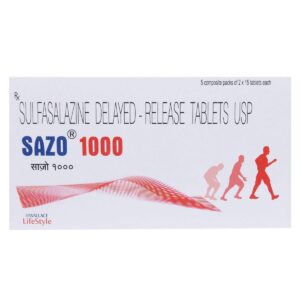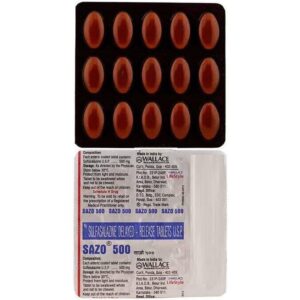SULPHASALAZINE
SULPHASALAZINE: Sulfasalazine is a medication that is primarily used to treat inflammation in the gastrointestinal tract, particularly in conditions like ulcerative colitis and Crohn’s disease. It belongs to the class of drugs known as 5-aminosalicylates.
The mechanism of action of sulfasalazine is not entirely clear, but it is believed to work by reducing inflammation in the bowel. It is thought to have both local anti-inflammatory effects in the gut and systemic effects that reduce the overactive immune response. Sulfasalazine is converted into its active form, mesalamine, in the colon, where it exerts its anti-inflammatory effects.
The typical dose of sulfasalazine for adults is usually started at a low dose and gradually increased based on the response and tolerance of the patient. The initial dose is usually around 500 mg to 1000 mg per day, divided into two to four doses. The dose can be gradually increased to a maximum of 3 grams per day. It is typically taken with food to minimize gastrointestinal side effects.
As with any medication, sulfasalazine has potential side effects. Common side effects include nausea, vomiting, loss of appetite, abdominal discomfort, headache, and rash. These side effects are usually mild and tend to improve over time. Less commonly, sulfasalazine can cause blood disorders, liver problems, kidney problems, and allergic reactions. It is important to monitor blood counts and liver function regularly while taking this medication.
Sulfasalazine may interact with other drugs, so it is crucial to inform the healthcare provider about all the medications, supplements, and herbal products being taken. This drug should be avoided in individuals with a known hypersensitivity or allergy to sulfa drugs.
It is essential to follow the prescribed dosage and regularly communicate with a healthcare professional to ensure the safe and effective use of sulfasalazine.


